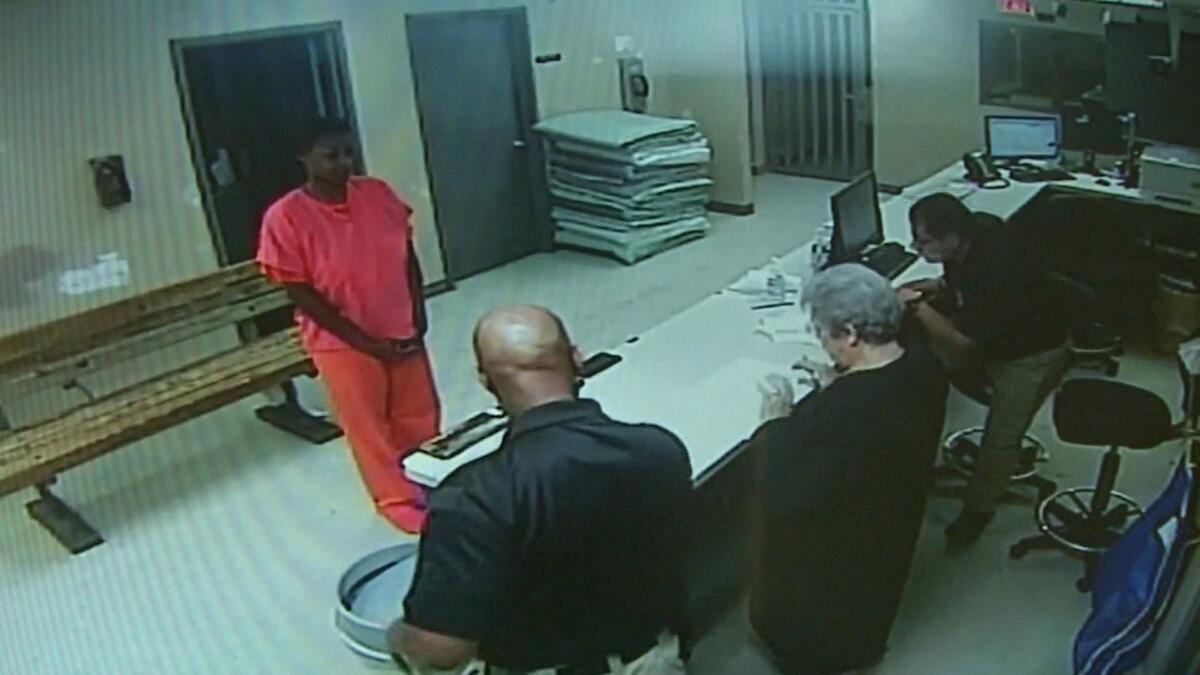Editorial: How the poor get locked up and the rich go free

- Share via
Arguments were filed last week in the 5th U.S. Circuit Court of Appeals in support of Maranda Lynn ODonnell, a young mother who was held in a Houston jail for three days last year because she couldn’t pay $2,500 in bail. Her alleged crime? Driving with an invalid license.
ODonnell’s plight is similar to that of thousands of people each year in Texas, California and around the nation who are arrested, then jailed without any finding of guilt or innocence because they don’t have the money to buy their release. As in California, Harris County prosecutors and judges determine the level of bail by consulting a schedule that assigns an amount to the offense but does not answer a set of questions tied directly to the purpose of bail: Can this defendant afford it? Is she a risk to flee? Does she pose a threat to public safety?
Recall that another Texas driver, Sandra Bland, was arrested in 2015 and died in jail while waiting for her family to try to scrape together $515 in bail. Her story is often and appropriately juxtaposed with the saga of Robert Durst, who was charged in Texas with murder in 2001. Durst, one of the heirs to a vast New York real estate fortune, could afford his $300,000 bail and was released. But the money did not reduce the risk. He fled.
Unjust money bail policies have improperly stripped people of their basic rights for too long.
Meanwhile, the typical U.S. jail is about 60% filled not with convicted criminals but with people awaiting trial, stuck behind bars not because of their guilt or innocence or their risk to flee, but because of their poverty.
Such a system is unjust. And stupid.
The federal criminal justice system virtually eliminated money bail half a century ago, so bail injustices persist because of the sluggishness of the states. But momentum has been building for bail reform across the nation, and money bail has been severely restricted or eliminated and replaced with risk-based systems in Washington, D.C.; Kentucky; New Jersey; and California’s Santa Clara County. Even in unexpected places like Missouri and Alabama, courts now consider a defendant’s ability to pay before setting bond.
U.S. Sens. Kamala Harris (D-California) and Rand Paul (R-Kentucky) have introduced a bill in Congress to help entice states to opt for risk-based pretrial release instead of money bail.
Earlier this year, the California Assembly killed a bail overhaul bill that would have tied pretrial release not to wealth but to risk — the likelihood that the defendant would fail to show up for trial or would do harm to others while out of jail. Leading opponents included the bail industry and prosecutors. An identical bill, having moved through the state Senate, will come before the Assembly when lawmakers return to work next week.
Before voting, they would be wise to peruse the briefs filed in ODonnell’s case and to refrain from scoffing at the pretrial release systems in supposedly backward red states like Texas. They should note instead that the strongest supporters of ODonnell and sweeping reform include Harris County Dist. Atty. Kim Ogg and Sheriff Ed Gonzalez, who want a smarter, more just pretrial release system so that their jails can be used to house serious criminals rather than traffic violators who don’t have bail money. They have put Texas in the vanguard of justice. It is difficult to identify prosecutors or sheriffs in blue California who would take such principled stands.
Like landmark lawsuits that challenged the segregation of schools and other public facilities, the Texas case asks how it is possible that we have put up with such an obviously unjust system for so long. Like critics of the California Senate bill, Harris County has acknowledged problems with its bail system and says it is working to change that, if only it can be given a little time. But already generations of criminal defendants who ought to have been at liberty while preparing their trial defenses have needlessly languished in jail. Now even the Harris County district attorney and sheriff, plus dozens of other supporters in amicus briefs, are siding with the plaintiffs in arguing that unjust money bail policies have improperly stripped people of their basic rights for too long and that the practice must be scrapped and replaced by a constitutional system — not in the fullness of time, nor with all deliberate speed, but now.
Follow the Opinion section on Twitter @latimesopinion and Facebook
More to Read
A cure for the common opinion
Get thought-provoking perspectives with our weekly newsletter.
You may occasionally receive promotional content from the Los Angeles Times.









